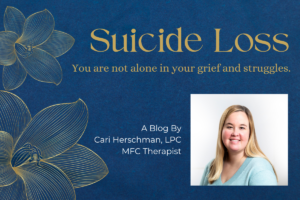Everyone has experienced anxiety in some way or another in their lifetime. It can show up in a lot of ways—a quick heartbeat, feeling overwhelmed, paralyzed by fear, insomnia, panic attacks, etc. Many times it is triggered by a task or an event and once that thing is resolved it goes away. Other times it lingers or shows up unexpectedly, disturbing every day life. How do you know when to get help? How do you know if you have an anxiety disorder?
Being diagnosed with an anxiety disorder can cause anxiety on its own, but the good news is by identifying the problem you can work on solutions. At Move Forward, we regularly work with clients struggling with anxiety. Our licensed counselors offer online therapy services, telehealth, and in-person (at select locations) counseling services to residents in Hershey, Pittsburgh, Philadelphia, Williamsport, Lancaster, Harrisburg, Gettysburg, and throughout the state of Pennsylvania.
Here are some signs you could benefit from receiving help for anxiety:
1.) You worry a lot.
Often people with anxiety disorders find they are worrying all the time about everything and nothing all at once. They have a sense of dread or doom about the upcoming day or night. These feelings often stem from work, family, children, relationships, money, health, or social interactions. It can be difficult to calm your anxiety, even if you recognize that it is irrational. A licensed counselor can work with you on some techniques that suit your life.
2.) You are frequently fatigued.
It takes a lot of work to be anxious. Your emotions are all over the board. Even if you manage to get sleep, likely it is not enough to feel fully rested. When you sit down it may be difficult to fully relax. It might feel like your mind is always being pulled in a hundred directions at once.
3.) You are having trouble sleeping.
As mentioned above, anxiety can make it difficult to sleep. If it’s only a night or two of missed sleep it’s not necessarily a serious issue but long-term lack of proper sleep can lead to a host of problems — including making your anxiety worse.
4.) You are struggling to concentrate.
When you are anxious your mind has trouble focusing on one thing. You may be at yoga but you may be thinking about what you are making for dinner that night, or how you need to get your oil changed on your car. You might read a page in a book and have no recollection of what it actually said at the end because your mind was elsewhere.
5.) You have an increased heart rate or palpitations.
One of the most prevalent physical symptoms of anxiety is an increased heart rate or irregularity. If you have ever had a panic attack you probably remember how it felt like your heart might beat out of your chest. If you experience any abnormal heart function it is always recommended that you visit your primary care physician for a complete check-up, oftentimes they can confirm that what you were feeling was a result of anxiety.
6.) You are often tense and irritable.
Anxiety causes people to feel on edge, short-tempered, and irritable. It can be difficult to remain calm, leading to major outbursts for minor things. It is no wonder really, it is hard to act calm when you are constantly feeling stressed and overwhelmed. This can put a strain on relationships and social life.
Help Is Available
It is not always easy to pinpoint what is causing you to feel anxious but that doesn’t mean you have to feel this way forever. Treatments, such as Cognitive Behavioral Therapy, have been shown effective in treating anxiety. Other techniques such as mindfulness and meditation can also be extremely beneficial.
Seeing a counselor for your anxiety can help you to learn healthy coping skills that fit your lifestyle. You can learn ways to prepare before anxiety hits and how to bring yourself out if you are becoming too anxious. All it takes is that first phone call to schedule an appointment.
Ready to begin counseling in Pennsylvania?
Our professionally-trained and licensed counselors have openings. Reach out to our administrative assistant to get started with feeling better. You can get the tailored help you need right now. We are here for you.

























